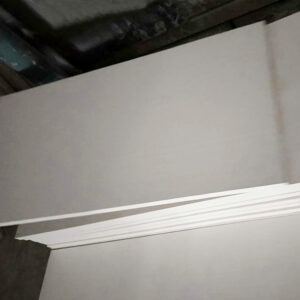Aluminum silicate ceramic fiber board is a type of high-temperature insulation material that is used in a variety of industrial applications. It is made from ceramic fibers that are mixed with a binder and then formed into boards or other shapes, which can be used for insulation and other purposes.
Aluminum silicate ceramic fiber board is known for its excellent thermal insulation properties, as it is able to withstand very high temperatures without degrading or breaking down. It is also lightweight and easy to handle, which makes it a popular choice for insulation applications in industries such as steel manufacturing, power generation, and petrochemicals.
Some key features and benefits of aluminum silicate ceramic fiber board include:
High temperature resistance: Aluminum silicate ceramic fiber board is able to withstand temperatures up to 2300°F (1260°C), making it ideal for use in high-temperature applications.
Low thermal conductivity: Aluminum silicate ceramic fiber board has a low thermal conductivity, which means that it is able to effectively insulate against heat transfer.
Lightweight: Aluminum silicate ceramic fiber board is lightweight and easy to handle, which makes it easy to install and transport.
Chemical resistance: Aluminum silicate ceramic fiber board is resistant to a wide range of chemicals, making it suitable for use in corrosive environments.
Sound absorption: Aluminum silicate ceramic fiber board has good sound absorption properties, which can help to reduce noise in industrial applications.
Overall, aluminum silicate ceramic fiber board is a versatile and effective insulation material that can provide excellent thermal insulation in high-temperature applications. aluminium silicate ceramic fiber board Its lightweight, low thermal conductivity, and chemical resistance properties make it a popular choice for a variety of industrial applications.
Aluminum silicate ceramic fiber board has several advantages over other types of insulation materials, such as fiberglass, mineral wool, and foam insulation.
Here are some of the key differences:
Temperature resistance: Aluminum silicate ceramic fiber board can withstand higher temperatures than other types of insulation materials, making it ideal for high-temperature applications.
Thermal conductivity: Aluminum silicate ceramic fiber board has a lower thermal conductivity than many other types of insulation materials, which means it is more effective at insulating against heat transfer.
Chemical resistance: Aluminum silicate ceramic fiber board is highly resistant to chemicals, which makes it suitable for use in corrosive environments.
Durability: Aluminum silicate ceramic fiber board is highly durable and can withstand wear and tear over time, making it a long-lasting insulation solution.
Ease of installation: Aluminum silicate ceramic fiber board is lightweight and easy to handle, which makes it easy to install and transport.
However, aluminum silicate ceramic fiber board may be more expensive than other types of insulation materials, and it may not be suitable for all applications, depending on the specific requirements of the project.
Overall, aluminum silicate ceramic fiber board is a highly effective insulation material that offers several advantages over other types of insulation materials, particularly in high-temperature and corrosive environments. However, it is important to consider the specific requirements of the project when selecting an insulation material to ensure the best performance and cost-effectiveness.
